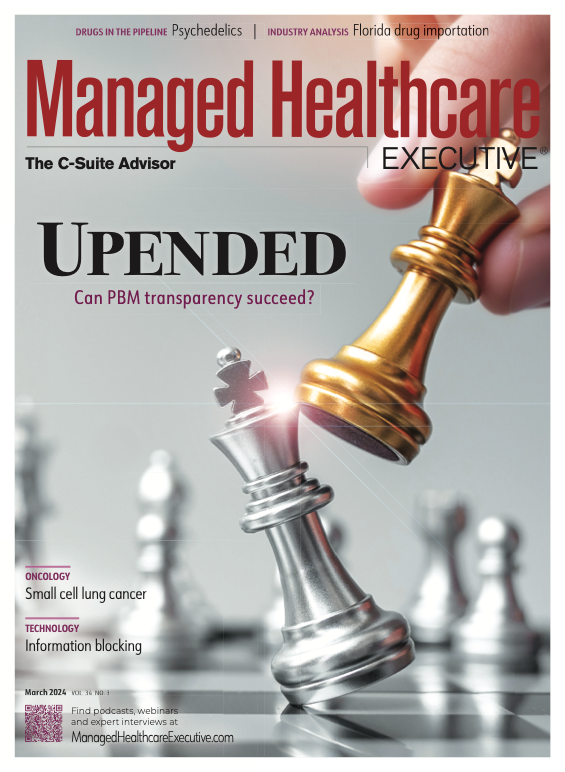Information Blocking Will Cost Hospitals, Other Providers Under Proposed ONC Rules
Hospitals and healthcare software developers are adjusting to a world in which blocking healthcare data will come with potentially stiff penalties under rules proposed by the Office of the National Coordinator for Health Information Technology (ONC).
When Congress passed the 21st Century Cures Act in 2016, a major area of emphasis was to make it easier for patients and their healthcare providers to access and utilize the rapidly increasing amount of personal health data. The challenge had two key components: a technical one, which involves making it easier to share data across disparate healthcare information technology (HIT) platforms; and a behavioral one, which involves teaching the industry to unlearn the impulse to keep data under lock and key for privacy and self-interested proprietary reasons.
Donald Rucker, M.D.

In November 2023, the Office of the National Coordinator for Health Information Technology (ONC) released proposed regulations aimed at tackling the latter component. The agency, which sets HIT policy for the federal government, proposed new disincentives that would apply to healthcare providers that violate the Cures Act’s prohibition on interfering with the exchange or use of electronic health information. The practice is known in the industry as “information blocking,” and it’s a major problem, according to Don Rucker, M.D., the former ONC national coordinator.
“Information blocking prevents competition, consumer choice and modern digital innovation,” Rucker says. “It prevents transparency and raises costs for the ultimate payers of U.S. healthcare — patients, taxpayers
and employers.”
The disincentives would apply to entities that are enrolled as Medicare providers or suppliers.
Under the proposed rules, hospitals found to have engaged in information blocking would not qualify as a “meaningful user” of electronic health records (EHRs) during the reporting period in which the violation occurred. They would therefore not qualify to earn the three-quarters of the annual market basket increase payment associated with being a meaningful EHR user. Critical access hospitals would have their payments reduced to 100% of reasonable costs rather than 101% in the year in question. A simulation by CMS suggested that the disincentive would have a median disincentive amount of $394,353.
Similarly, providers who participate in the Merit-based Incentive Payment System (MIPS) who are found to be blocking health information would also lose the status of meaningful EHR user. Providers required to report on the Promoting Interoperability performance category of MIPS would receive an automatic score of zero in that performance category, potentially resulting in a negative payment adjustment.
Providers who are accountable care organizations (ACOs) or who participate in an ACO would be vulnerable to penalties under the ONC’s proposed rule. ACOs would lose eligibility to participate in the Medicare Shared Savings Program for at least a year if they are found to have engaged in information blocking.
Rucker, who became chief strategy officer at the healthcare interoperability platform developer 1upHealth in 2021 after four years at the ONC, says the disincentives are critical, because the current HIT environment is built around the premise that data will rarely leave the healthcare delivery system. He says providers often have the mindset that sharing information with other providers makes it easier for high-margin care to escape to their competitors. That makes them reluctant to embrace the free flow of information.
“The reality is that the providers aren’t asking for the [application programming interface] to enable information sharing,” he says. “The EHR vendors are typically only building the minimum functionality required by the government.”
The results, he said, hurt both patients and payers. “For patients, the issue is often not [only] high costs at every step of the way but also the poor care they receive from providers working off incomplete medical histories,” he says. “For many provider systems, limited data-sharing capabilities in EHRs mean they can escape pressures to be cost competitive or to innovate in alternate modes of care.”
Providers puzzled
David Pittman, M.P.H.

However, David Pittman, M.P.H., director of communications and regulatory affairs at the National Association of ACOs, says there’s a more basic reason providers might engage in information blocking: a lack of clarity about what the term actually means. “Our ACO members have told us that they still don’t understand what information blocking is or how entities like ACOs are defined,” he says. “It’s clear that the government needs to do a better job at telling providers in the trenches of our healthcare system more about these programs and how they fit into them.”
Jordan Everson, Ph.D., a public health analyst at the ONC, says it is understandable that some providers might not have a clear understanding of what does and does not constitute information blocking. “We suspect it is hard to separate general friction — which may not really meet the definition of information blocking — from information blocking [that is] likely to meet the definition specified in the Cures Act and subsequent regulation,” he says.
Everson and colleagues have been examining rates of perceived information blocking for several years. He says the existing evidence suggests information blocking is decreasing as awareness of the law increases. Last year, Everson and colleagues published their analysis of a 2021 survey of more than 2,000 U.S. hospitals. In that survey, 42% of respondents reported experiencing suspected information blocking, and 36% of respondents said they had experienced it from other healthcare providers. However, updated data from 2022 suggested a dramatic drop in perceived information blocking by providers. That year, only 12% of hospitals said they had experienced information blocking by other providers. Unpublished data from 2023 suggest a further drop in perceived information blocking, Everson says. The downward trend is similar to an earlier decrease in perceived information blocking by HIT developers.
Jordan Everson, Ph.D.

“[Healthcare] providers reacted later — after the regulation went into effect — perhaps because they were less aware or focused on the regulation ahead of time,” he says. Yet Everson notes that their surveys give hospitals the option of answering that they “don’t know” the answer when asked about information blocking. He says that less than 10% take that option.
For his part, Rucker is skeptical of claims that lack of education is at the heart of information blocking. “The missing piece is typically not a lack of education, but perverse incentives,”
he said.
He says developers purposely inhibit information sharing by blocking modern interoperability protocols or subtly rendering them ineffective. “One can confidently say this because the same EHRs that make it difficult to share data with apps are simultaneously sharing data over internal networks continuously and at a vast scale,” he says.
Questioning incentives
Pittman says his organization is also worried about the specific structure of the proposed disincentives, which he says would subject certain entities to double penalties. For example, a physician practice that is an ACO could be penalized as a practice and then as an ACO.
“That’s duplicative,” he says. “Instead, punish the individual providers or provider entities and information blocking will be deterred that way.”
Rather than focusing on punishment, he says the ONC should consider using corrective action plans as a tool to prompt compliance. “This would allow entities caught information blocking a chance to identify the problem and install steps to prevent it from happening again,” he says. Such an approach is preferable to blocking participation in value-based care programs, he says, as such programs benefit the healthcare system as a whole.
ONC fact sheets
In a letter to the ONC commenting on the proposed regulations, Deborah Adair, M.P.H., M.S., of the Mass General Brigham healthcare system, echoed the call for the use of corrective action plans prior to imposing penalties. She added that the regulations should also include a clear appeals process.
“[We] find that the ruling lacks clear guidance on the opportunity to appeal an information blocking determination before the OIG [Office of Inspector General] refers the determination to the authority agency for the application of appropriate disincentives,” she wrote.
Everson notes that “determining that any specific action [that] constitutes information blocking will depend on an investigation and the facts and circumstances.” Adair said she would like any penalties to be tailored to the size and circumstances of a given violation.
In the meantime, Everson says organizations that are worried about potentially running afoul of the new regulations should refer to webinars, blog posts and fact sheets on the ONC’s website. He says leaders of health systems should look at their policies, processes and staff training programs to ensure they are optimized for information exchange, are taking full advantage of technological capabilities and are pressing developers to enhance information-
sharing functionality.
It is unclear when the ONC will finalize the proposed disincentives. A spokesperson for the agency said officials are currently reviewing public comments that were received by the January deadline.
Jared Kaltwasser is a writer in Iowa and a frequent contributor to Managed Healthcare Executive.

In the Scope of Virtual Health and the Future of “Website” Manner, Per Ateev Mehrotra
August 10th 2023Briana Contreras, an editor of Managed Healthcare Executive, had the pleasure of catching up with MHE Editorial Advisory Board Member, Ateev Mehrotra, MD, MPH, who is a professor of healthcare policy at Harvard Medical School and an Associate Professor of Medicine and Hospitalist at Beth Israel Deaconess Medical Center.
Listen